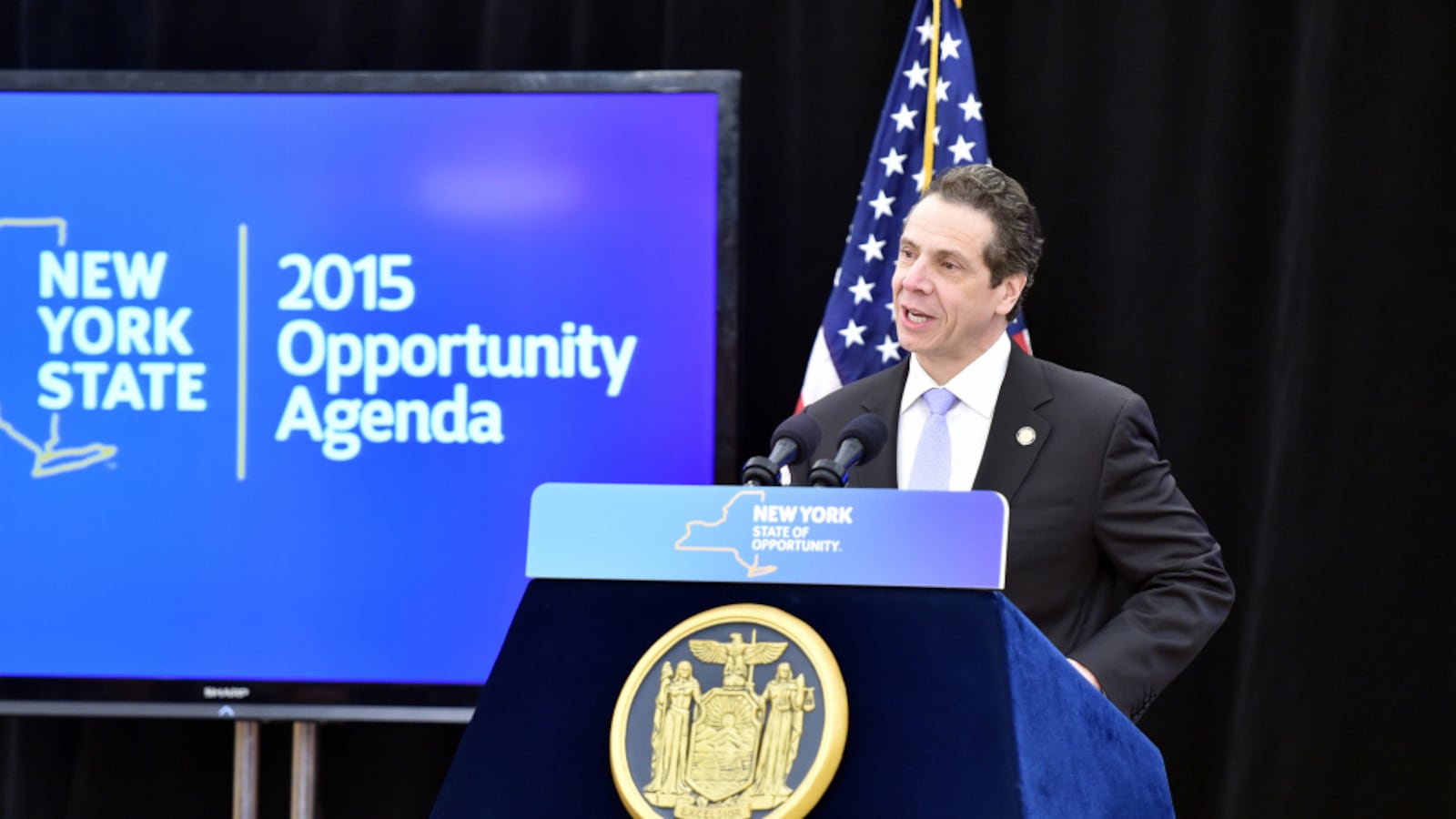Gov. Cuomo promised an aggressive education agenda this year, and he delivered.
Cuomo announced plans to push for a broad overhaul of state education policy on Wednesday, which will include raising the state’s cap on charter schools, increasing the state’s role in teacher evaluations, and lengthening the time it takes for teachers to earn tenure.
Cuomo’s plans aren’t guaranteed to become policy: The changes require legislative action, and the negotiations that precede a final budget deal often lead to unexpected outcomes and concessions. But they form the broadest, most ambitious set of changes he’s proposed as governor, and set the stage for fierce policy fights with teachers unions and other advocates.
“Our education system needs dramatic reform, and it has for years,” Cuomo said. “This is the year to roll up our sleeves and take on the dramatic challenge that has eluded us for so many years and for so many reasons.”
In exchange for the legislative changes, Cuomo said he would increase funding by $1.1 billion, or 4.8 percent — essentially meeting teacher unions halfway, as they have requested a $2.2 billion increase.
Here’s a breakdown of the governor’s proposals.
Teacher evaluations: Cuomo’s proposal would increase the portion of a teacher evaluation controlled by the state from 20 percent to 50 percent, which for many teachers would boost the significance of state test scores. It would also diminish the principals’ role by relying on the observation of an independent evaluator.
The state’s roughly 700 school districts have a patchwork of evaluation plans, which Cuomo described as “baloney” on Wednesday. His proposal is an attempt to stop what he has called “local inflation” of scores, which has been more evident outside of New York City.
Cuomo’s proposal would restrict district plans by requiring the other half of a teacher’s rating to come from classroom observations, and would make high scores on both halves necessary to earn an overall “effective” or “highly effective” rating.
Cuomo stressed that he wants the evaluations to create incentives, too. He proposed offering bonuses of up to $20,000 to teachers with highly effective ratings, just as he did in last year’s speech. Those bonuses would require the agreement of the district and the local teachers union, though, and UFT President Michael Mulgrew said he still wasn’t interested.
“Individual merit pay? It’s been completely debunked,” Mulgrew said.
Teacher tenure: Cuomo is proposing that teachers only become eligible for tenure after five consecutive years of “highly effective” or “effective ratings.” That would be a significant increase from the current three-year probation period, and if a single “developing” rating could derail a teacher’s path to those job protections, it would add to the pressure associated with teacher evaluations.
Other legislation Cuomo is proposing would keep a student from being assigned two teachers with “ineffective” ratings two years in a row. (The plan does not specify how that would work for middle and high-school students with multiple teachers.)
Charter schools: Cuomo’s proposal would add 100 charter schools to the state limit, bringing the total to 560, and remove the regional distinctions that restricted some charters to New York City and others to parts of the state where there was less demand. That could set up future fights over the cap the next time the limit nears — and with the Success Academy network recently applying for 14 charters at once, for example, that might not be so far into the future.
The governor said he would also be proposing “anti-creaming legislation” to ensure charter schools are teaching their “fair share” of English language learners, low-income students, and students with disabilities. The provision would require schools to submit enrollment rates for each of those groups of students to the state at the beginning and end of each school year and bi-monthly — providing a trove of new data to support or refute the idea that high-needs students leave charter schools during the school year. It would also require charter schools to add lottery preferences for low-income students, students enrolled “in a failing school,” and children of staff members.
Cuomo would also increase per-pupil funding for charters by $75 — not a full win for charter school advocates, who want their school funding increases to be commensurate with increases for district schools.
Struggling schools: Cuomo called for a new law that would appoint nonprofit groups, school-turnaround experts, or other school districts to oversee schools that have fallen on the state’s lowest performing list for three years.
Based on a turnaround model used in Massachusetts, the law would give those “receivers” the authority of local superintendents, allowing them to restructure struggling schools, overhaul their curriculums, and offer extra pay to attract successful teachers. It would also let them to override labor agreements in order to hire “underperforming” teachers and administrators.
The receivers would be required to bring a bevy of support services for students and their families to the schools — a plan to turn them into “community schools” that mirrors New York City’s program for troubled schools.
Cuomo proposed setting aside $8 million for those overhauls. The schools would also get priority for state grants that fund pre-kindergarten, extra learning time, and early-college high school programs.
Teacher training: Cuomo proposed closing down teacher training programs where 50 percent of graduates fail to pass a state certification exam in three consecutive years.
He also proposed paying the CUNY or SUNY tuition to “top candidates” who commit to teaching in state schools for five years after graduation, creating a statewide teacher residency program, and mandating new GPA and GRE requirements for education programs.
School governance: Cuomo threw support behind the renewal of mayoral control of New York City schools, and encouraged other cities to apply for mayoral control as well.
Teacher discipline: Teachers facing accusations of physical or sexual abuse should get an expedited hearing process, Cuomo said.

